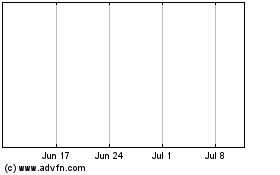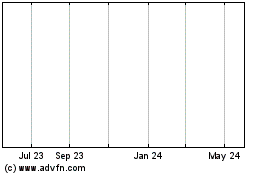Santalis Pharmaceuticals Announces Positive Results From a Study Using 10% East Indian Sandalwood Oil (EISO) Serum Formulatio...
June 27 2016 - 6:15AM
Business Wire
Santalis Pharmaceuticals today announced positive results from
its single-center, open-label, efficacy and tolerability
proof-of-concept study using a proprietary 10% East Indian
Sandalwood Oil (EISO) serum formulation for the treatment of
mild-to-moderate plaque psoriasis. The results of the study showed
the EISO serum formulation to be safe, well tolerated, and
efficacious for patients 18 to 65 years of age with a maximum of
10% treatable body surface area involvement of mild-to-moderate
plaque psoriasis. Santalis’ research has shown EISO is a
broad-acting anti-inflammatory agent that strongly suppresses the
activity of factors including PDE4 and IL-17 that are believed to
contribute to psoriasis. In addition, EISO has been shown to reduce
the hyper-proliferation in psoriatic skin that leads to plaque
formation.
The 28-day treatment regimen consisted of a twice-daily
application of 10% EISO serum to the affected areas. Preliminary
results indicated that the EISO treatment was effective, safe and
well tolerated. Of the 12 patients enrolled in the pilot study with
mild to moderate psoriasis, 9 patients experienced resolution of
all the treated plaques, and 2 patients experienced mild to
moderate improvement of their psoriatic skin. One patient withdrew
with a mild application site adverse event that resolved upon
discontinuation of the study medication.
“Plaque psoriasis can cause significant skin irritation and
discomfort for patients and significantly impact their overall
quality of life,” said Professor Kurt Gebauer, Lead Investigator at
the Fremantle Dermatology Group. “We are pleased with the results
of the recent study and look forward to the development of a new,
efficacious and safe botanical drug to support our goal of
meaningfully improving outcomes for all our patients psoriatic
disease. The performance of the serum is evidenced by the fact that
all of the patients asked to continue using the product after the
end of the study.”
"These results provide preliminary confirmation that the
anti-inflammatory and anti-proliferative effects of EISO we’ve seen
in our prior pre-clinical studies will translate well to the
clinic,” stated Dr. Corey Levenson, Chief Scientific Officer of
Santalis. “We’ve leveraging EISO’s ability to target inflammatory
and proliferative pathways to treat skin diseases such as eczema
and psoriasis. We believe that TFS’ pharmaceutical-grade EISO, with
its very favorable safety profile and multi-target activity, could
provide a unique treatment option for patients.”
ABOUT PLAQUE PSORIASIS
Psoriasis is an autoimmune disease that causes raised, red,
scaly patches to appear on the skin. Psoriasis typically affects
the outside of the elbows, knees or scalp, though it can appear on
any location. People report that psoriasis is itchy and painful,
and the skin can crack and bleed. The skin cells in people with
psoriasis grow at an abnormally fast rate, which causes the buildup
of psoriasis lesions. Men and women develop psoriasis at equal
rates. Psoriasis also occurs in all racial groups, but at varying
rates. About 1.9 percent of African-Americans have psoriasis,
compared to 3.6 percent of Caucasians. Psoriasis often develops
between the ages of 15 and 35, but it can develop at any age. About
10 to 15 percent of those with psoriasis get it before age 10.
Plaque psoriasis is the most common form of the disease and appears
as raised, red patches covered with a silvery white buildup of dead
skin cells or scale.
Topical treatments with and without steroids usually are the
first choice in treating psoriasis. Prescription topical drugs slow
down skin cell growth and reduce inflammation. Treatment can
include phototherapy which involves exposing the skin to
ultraviolet light on a regular basis under medical supervision.
Systemic medications are often prescribed for individuals with
psoriatic arthritis and those with moderate to severe psoriasis
whose symptoms are unresponsive to other treatments. Systemic
medications are taken orally, by injection or infusion and fall
into two categories, traditional systemics and biologics.
ABOUT SANTALIS PHARMACEUTICALS
Santalis Pharmaceuticals, Inc. is a wholly owned subsidiary of
TFS Corporation, Ltd. (ASX: TFC). Santalis Pharmaceuticals, and its
sister company, Santalis Healthcare Corporation (formerly known as
VlroXis Corporation), were acquired by TFS in July 2015. TFS
operates the world’s largest East Indian Sandalwood tree
plantations in Australia and is the only source of cultivated,
sustainable, pharmaceutical-grade East Indian Sandalwood Oil.
Santalis is developing scientifically and clinically validated over
the counter and prescription products that utilize TFS' EISO, with
development programs focused in oral health and dermatology, where
EISO's well documented safety profile and anti-infective,
anti-proliferative and anti-inflammatory properties are well suited
to a number of prevalent and underserved dermatological conditions.
In addition to the psoriasis study, Santalis has ongoing Phase 2
studies in oral mucositis and pediatric Molluscum contagiosum, and
is preparing to initiate a Phase 2 study for pediatric eczema and a
Phase 3 study for pediatric HPV skin warts.
ABOUT INDIAN SANDALWOOD
Indian sandalwood has a history as a tradable commodity spanning
thousands of years, but is now endangered due to the illegal
harvest of wild trees throughout the world. As a result, Indian
sandalwood is the world's most expensive tropical hardwood. Indian
sandalwood oil is a globally important ingredient in fine
fragrances, cosmetics and toiletries, Indian consumer products and
is used for traditional medicinal purposes (Ayurvedic and Chinese
medicine). The wood is used for high quality carvings and artifacts
and religious worship in the Hindu and Buddhist faiths. The global
pharmaceutical market has the potential to be a significant
consumer of Indian sandalwood.
View source
version on businesswire.com: http://www.businesswire.com/news/home/20160627005339/en/
Santalis Pharmaceuticals, Inc.Jim Traa, 210-399-2318CBOmobile:
210-862-3026jim@santalispharma.com
TFS Corp (ASX:TFC)
Historical Stock Chart
From Mar 2024 to Apr 2024

TFS Corp (ASX:TFC)
Historical Stock Chart
From Apr 2023 to Apr 2024
